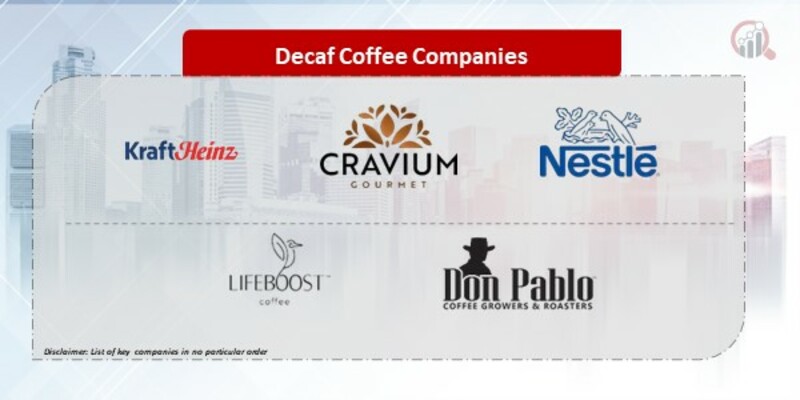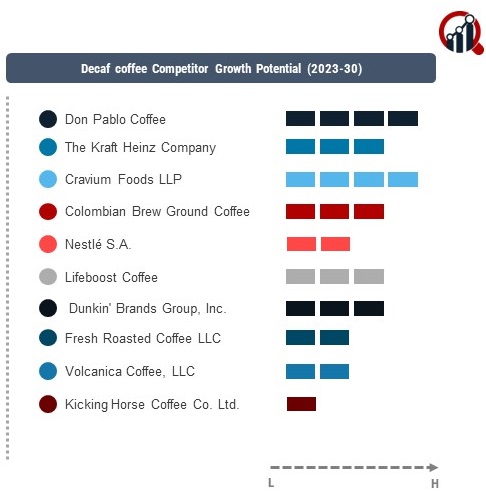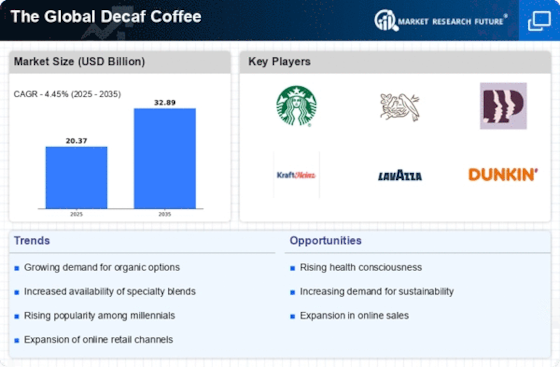Top Industry Leaders in the Decaf Coffee Market

The Decaf Coffee market, a segment within the broader coffee industry, has witnessed significant growth as consumer preferences shift towards healthier options. This analysis provides insights into the competitive dynamics of the Decaf Coffee market, covering key players, strategies adopted, factors influencing market share, news and emerging companies, industry trends, current investment patterns, and a significant development in 2023.
Key Players:
Don Pablo Coffee (US)
The Kraft Heinz Company (US)
Cravium Foods LLP (India)
Colombian Brew Ground Coffee (Colombia)
Nestlé S.A. (Switzerland)
Lifeboost Coffee (US)
Dunkin' Brands Group, Inc. (US)
Fresh Roasted Coffee LLC (US)
Volcanica Coffee, LLC (Costa Rica)
Kicking Horse Coffee Co. Ltd. (Canada)
Koffee Kult (US)
Eight O’Clock Coffee Company (US)
Cafedirect PLC (UK)
Grindhouse Coffee Roasters (UK)
Luigi Lavazza S.P.A. (Italy)
Strategies Adopted:
In a market marked by evolving consumer preferences and health-conscious choices, companies in the Decaf Coffee segment adopt various strategies to maintain competitiveness. Diversification of product portfolios is a common approach, with companies offering decaf coffee in various formats, including ground coffee, instant coffee, and coffee pods. This strategy enables them to cater to different consumer preferences.
Collaborations and partnerships with coffee producers and retailers are another prevalent strategy. Securing a consistent and high-quality supply of decaffeinated coffee beans is crucial, and collaborations with key stakeholders in the coffee supply chain help companies maintain a competitive edge. Additionally, marketing and promotional activities that highlight the health benefits of decaf coffee contribute to brand visibility.
Market Share Analysis:
The Decaf Coffee segment. Product quality and taste remain paramount, as consumers seek decaf options that match the flavor profile of regular coffee. Companies investing in advanced decaffeination technologies to preserve the coffee's taste and aroma often gain a competitive advantage.
Brand recognition and consumer trust also play a pivotal role. Established brands that have a history of delivering quality coffee products, including decaf variants, tend to command a significant market share. Effective distribution channels, encompassing supermarkets, specialty stores, and online platforms, contribute to market presence and accessibility.
News & Emerging Companies:
The Decaf Coffee market often revolves around emerging trends, innovations, and the entry of new players. Emerging companies may focus on sustainable and ethical sourcing of decaffeinated coffee beans, appealing to environmentally conscious consumers. Additionally, news may highlight breakthroughs in decaffeination processes, ensuring the retention of coffee's natural flavors without compromising quality.
The emergence of boutique or artisanal decaf coffee brands catering to niche markets is a notable trend. These companies often differentiate themselves by offering unique decaf coffee blends, showcasing the diversity and sophistication of the decaf coffee landscape.
Industry Trends:
The Decaf Coffee market reflect a commitment to sustainability, quality improvement, and market expansion. Investments in sustainable and ethical sourcing practices for decaffeinated coffee beans demonstrate the industry's responsiveness to the growing demand for socially responsible products.
Technological investments are geared towards improving decaffeination processes. Companies may invest in advanced methods such as the Swiss Water Process or CO2 extraction to ensure that the decaffeination process is both effective and environmentally friendly. Investments in research and development also contribute to the enhancement of flavor and aroma in decaf coffee.
Marketing investments often focus on digital platforms, with companies leveraging social media and e-commerce to reach a wider audience. Consumer education about the decaffeination process and the health benefits of decaf coffee is a common theme in marketing campaigns.
Competitive Scenario:
The Decaf Coffee market presents a competitive landscape where established players leverage their brand reputation and distribution networks to maintain dominance. However, the market is dynamic, with emerging companies introducing innovative products and appealing to niche markets. The overall competitive scenario is characterized by a balance between industry giants and nimble newcomers, fostering continuous growth and innovation.
Recent Development
The Decaf Coffee market was the introduction of a new line of premium decaf coffee pods by one of the major players. This marked a response to the increasing demand for convenient and high-quality decaf coffee options in the booming coffee pod market.
The development showcased the industry's adaptation to changing consumer preferences, emphasizing the importance of convenience without compromising on taste. This launch also reflected the brand's commitment to staying at the forefront of market trends and meeting the diverse needs of coffee enthusiasts seeking decaffeinated options.










